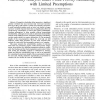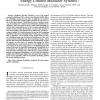140 search results - page 1 / 28 » Limitations of Current Wireless Scheduling Algorithms |
RTS
2011
12 years 11 months ago
2011
—Preemptive scheduling often generates a significant runtime overhead that may increase task worst-case execution times up to 40%, with respect to a fully non preemptive executi...
PIMRC
2008
IEEE
13 years 11 months ago
2008
IEEE
Wireless mesh networks (WMNs) are one of the key features of beyond 3G system because of their flexible and lowcost deployment. IEEE 802.16 mesh mode has recently emerged as an alt...
ICC
2009
IEEE
13 years 11 months ago
2009
IEEE
— Both fast scheduling and spatial signal processing have proven to be capacity-increasing methods in wireless communication systems. However, when applied in the downlink of a c...
CORR
2010
Springer
13 years 4 months ago
2010
Springer
Multiuser diversity (MUDiv) is one of the central concepts in multiuser (MU) systems. In particular, MUDiv allows for scheduling among users in order to eliminate the negative effe...
ICC
2008
IEEE
13 years 11 months ago
2008
IEEE
Abstract—We develop a family of distributed wireless scheduling algorithms that requires only O(1) complexity for M-hop interference model, for any finite M. The recent technolo...


